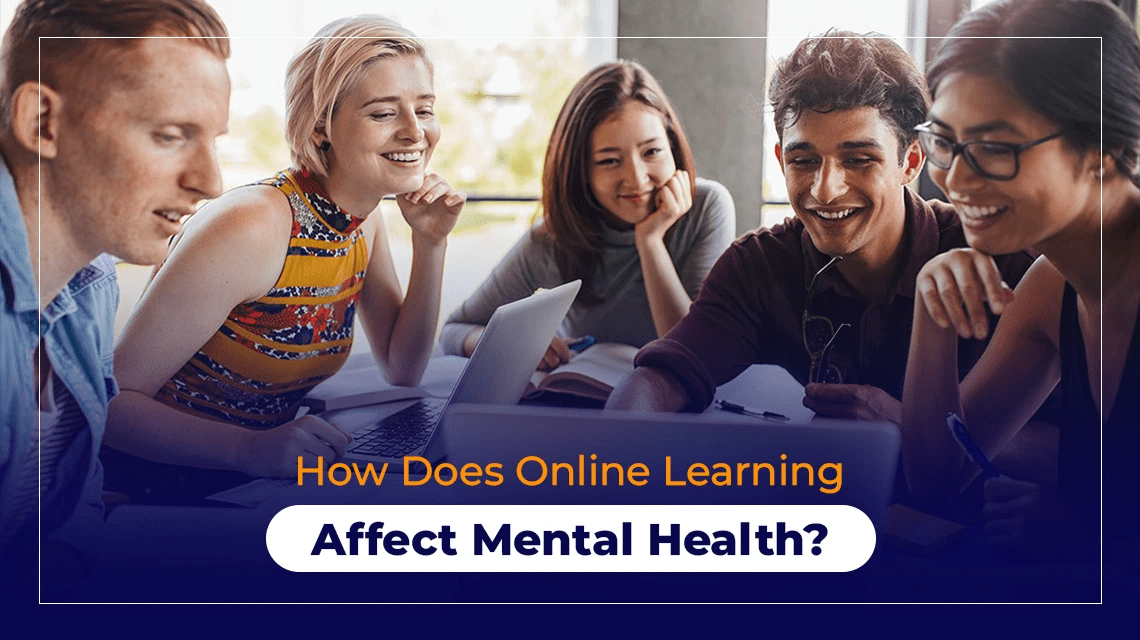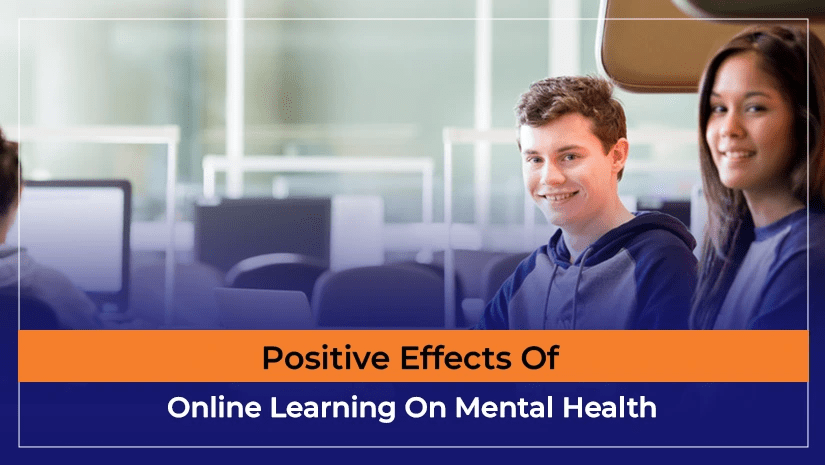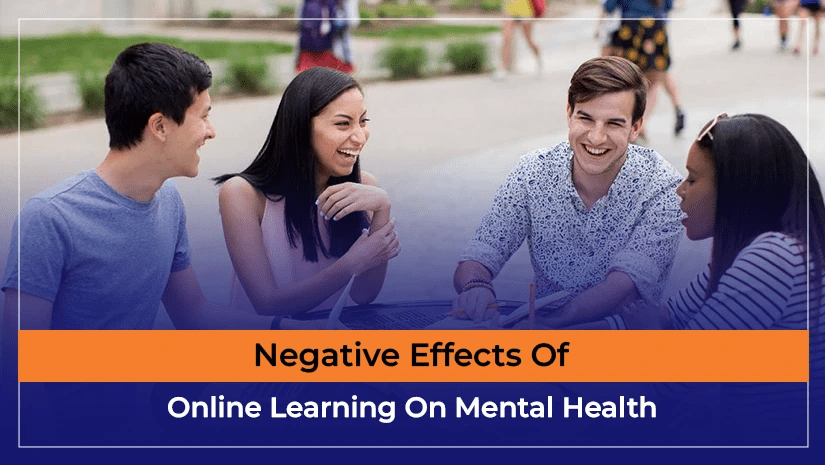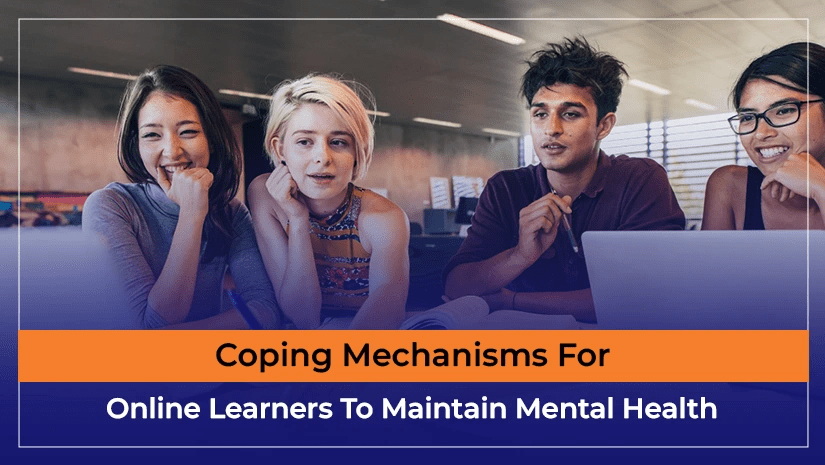
Online learning is the use of technology to facilitate learning and teaching in an online environment. It has become trendy in recent years as technology advances and more people gain access to the internet. However, there is a growing concern about its potential impact on mental health.
Many students are experiencing anxiety, depression, and other issues because of continuous online classes. Here we will explore how does online learning affect mental health of students, how it affects them positively and negatively, and ways to overcome those. So, let’s get right in.

Online learning offers flexibility, convenience, and access to a variety of resources. But it can also create a positive impact on your mental health. Let’s explore the psychological and emotional benefits of online learning.
Online learning provides students convenience and flexibility, which is unavailable in physical in-person classes. It allows students to complete their studies from anywhere and at any time. This can reduce stress and anxiety since you won’t have to go to a certain place at a particular time to attend classes.
Students can invest their commuting time and energy in other activities, which is also beneficial for mental health. Again, taking online classes from home is very convenient and relaxing. Self-paced online classes are very flexible as well and you can attend classes anytime you want.
Many students have social anxiety and feel awkward interacting with fellow students and teachers in physical classes. However, online learning can be a great way for them to reduce social anxiety. Online classes do not require any physical presence in classrooms.
Students can take part in online classes without feeling overwhelmed or anxious. Again, online classes allow students to ask instructors and classmates questions without worrying about being judged or feeling uncomfortable.
Online learning can foster mental health in many ways. It can provide students with access to mental health resources. Many online programs provide students access to mental health tools like counselling, therapy, and support groups.
Students who do not have access to these tools can benefit from these tools. So, the impact of online classes on students' health is not mere or ignorable.
With online learning, students have access to the learning environment. It allows them to choose when and where they study. As a result, they can create a comfortable and safe learning environment for themselves. This benefits students who struggle with some classroom dynamics or face difficulty in noisy environments.
In addition, online learning can provide students with the tools and resources like mindfulness and relaxation techniques needed to manage their mental health. So they have complete control over their learning.
Must Read:

Online learning and mental health go hand in hand. Studies show that online learning can lead to several mental health, such as increased stress, anxiety, fatigue, and decreased sense of belonging.
Why is online learning bad for mental health? Here are the reasons:
Spending a lot of time before a computer screen can cause physical and mental fatigue, such as eye strain and headaches. Looking at a computer monitor for a long time also causes neck and back pain in the long run.
As a result, you may have long-term physical damage. Plus, working and staring at a computer screen can increase the risk of depression and anxiety. So, many mental and physical illnesses are associated with online learning.
One of the major issues of online learning is the feeling of isolation and loneliness. Students are generally used to interacting with their peers and teachers in person in physical classes. But in online classes, they have to interact through computer screens.
It may create a feeling of disconnection and a lack of motivation to participate in class activities. Moreover, students may also feel disconnected from the course materials. As a result, they fall behind in the coursework.
Online learning requires an extended level of self-discipline and the ability to keep the focus on tasks at hand for a long time without distraction. But it can be challenging for some students.
The lack of face-to-face interactions offered in physical classes makes some students distracted and start procrastinating. It can result in lower grades and failure.
The lack of social interaction is probably the biggest drawback of online learning. Students can start feeling isolated and disconnected from everything without regular physical meetings and conversations with fellow students and teachers.
This can develop frustration and a lack of motivation to complete coursework and assignments. It can also make students feel disconnected from the outside world, which can cause them to fear missing out. So, the fact that online learning limits physical interaction can damage students psychologically.

Creating a daily routine is essential for online learners to maintain their mental health. An organized daily routine allows students to focus on regular tasks and create a sense of normalcy. It also helps students stay in touch with their daily activities and stay on track.
Examples of setting up a routine include waking up at the same time every day, studying for a fixed number of hours, keeping some time for recreation, etc.
You cannot just study or work continuously and need to take breaks from time to time. Taking regular breaks will help you maintain sound mental health. Regular breaks will allow you to step away from your studies and participate in activities that will relax you.
You can indulge in activities like reading books, listening to music, or going for a short walk with your pet. These activities will refresh your mind and boost you up.
Physical activities like regular exercise and sports are essential for online learners to maintain their mental health. Exercise can reduce stress and promote relaxation. It will boost your energy level and improve your mood. You can do jogging, walking, yoga, stretching, or play any sports daily.
Connecting and talking to people will help online learners maintain good mental health. Talking to a family member or friends will help you reduce stress and create a sense of connection.
Regularly interacting with people will make you realize that you are not alone. Face timing, chatting, texting, or talking over the phone are excellent ways to connect with people.
If you experience any mental health issues during or after getting on board with online learning, you must talk to a mental health professional and consult with them. It will help you identify and address underlying issues causing your mental health concerns.
Mental health professionals will provide helpful insights and strategies for managing stress and fostering relaxation. You can take advantage of access to mental health care provided by online learning platforms.
With the knowledge of how does online learning affect mental health, you can now compare online and physical learning and choose one that suits your requirements. No matter which one you choose, you should prioritize your mental health to lead a stress-free, peaceful life.

February 27 2025

September 08 2025

June 06 2024

April 02 2024

 Dr. Shafiq
Dr. Shafiq
 February 25 2024
February 25 2024
 05:40:00
05:40:00
Do you have a career plan in a Senior Care or Supervisory Care position? If so, a Level 3 Diploma will help...
Read more...
 Dr. Shafiq
Dr. Shafiq
 February 25 2024
February 25 2024
 05:43:00
05:43:00
If you are living in the UK or planning to do that, you must know about the education system there. The UK&...
Read more...
 Dr. Shafiq
Dr. Shafiq
 February 25 2024
February 25 2024
 05:50:00
05:50:00
In the recent past, you had to have a four-year bachelor’s degree to start a career. With the rapid c...
Read more...